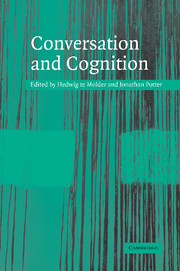Book contents
- Frontmatter
- Contents
- List of contributors
- Acknowledgements
- Transcription conventions
- 1 Talking cognition: mapping and making the terrain
- Part I The interface between cognition and action
- Part II Cognition in action
- 7 Is confusion a state of mind?
- 8 Cognition in discourse
- 9 From process to practice: language, interaction and ‘flashbulb’ memories
- 10 ‘My memory has been shredded’: a non-cognitivist investigation of ‘mental’ phenomena
- 11 Discursive psychology, mental states and descriptions
- References
- Index
9 - From process to practice: language, interaction and ‘flashbulb’ memories
Published online by Cambridge University Press: 22 September 2009
- Frontmatter
- Contents
- List of contributors
- Acknowledgements
- Transcription conventions
- 1 Talking cognition: mapping and making the terrain
- Part I The interface between cognition and action
- Part II Cognition in action
- 7 Is confusion a state of mind?
- 8 Cognition in discourse
- 9 From process to practice: language, interaction and ‘flashbulb’ memories
- 10 ‘My memory has been shredded’: a non-cognitivist investigation of ‘mental’ phenomena
- 11 Discursive psychology, mental states and descriptions
- References
- Index
Summary
Introduction
To make significant strides in reworking traditional understanding of cognition we need to engage cognitive scientists: we have to show that we can speak directly to the concerns which animate their disciplines. And this demonstration must not rest in theoretical or conceptual arguments, important as these are; instead, it is necessary to show how the results of empirical analyses mesh with, and have real implications for, research agenda and methodological developments in cognitive science.
To this end, I'm going to talk about a type of memory which has come to be known as flashbulb memory. These kinds of memories have been the subject of a substantial amount of research in cognitive psychology, particularly in the United States. In recent years some researchers have begun to reflect critically on the methodology of their research. Equally, there has been a willingness to question some of the core premises which have traditionally motivated their research. Finally there has been an openness to explore analytic techniques and data which would hitherto have been considered inappropriate for research in cognitive science. And it is at this juncture that the orientations and findings of conversation analytic and discourse analytic studies become relevant.
To begin, then, I'll give a brief account of the origins of the concept of flashbulb memory and outline some of the main themes which run through research on this topic.
- Type
- Chapter
- Information
- Conversation and Cognition , pp. 203 - 225Publisher: Cambridge University PressPrint publication year: 2005
- 6
- Cited by



